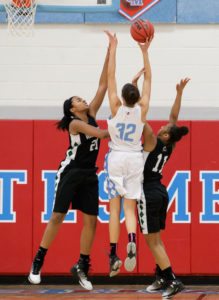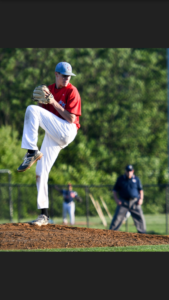Though the paths seniors Patrick Halligan and Clara Ford took to arrive at the collegiate level differ, both athletes faced similar challenges to get where they are today.
Halligan said he began playing baseball in kindergarten, when he was five years old. Now, 12 years later, he readies himself to play at George Mason University. He said he chose to attend George Mason because he felt comfortable with the coaching staff and he enjoyed the school’s atmosphere.
“I had a really good relationship with the coaches,” Halligan said. “I felt like I was at home.”
Varsity head coach Aaron Tarr said Halligan’s overall size and athleticism, ability to throw varying pitches with force and general effectiveness as a pitcher makes Halligan a recruit that is rare for George Mason.
“[George Mason] had to go after him,” Tarr said. “[Halligan] is at the level that Virginia Tech and University of Virginia usually go after.”
Tarr also said he thinks Halligan’s intense competitiveness and steady composure allow him to perform with patience.
“He has an ability to be very highly competitive without allowing [that competitiveness] to boil over into a space where he gets upset,” Tarr said. “That’s a huge advantage in baseball because showing a lot of anger on the field can be taken as a sign of weakness and people try to get after that.”
Despite his success, Halligan admitted that his development as a baseball player wasn’t always easy, and he found failures difficult to manage at times.
“I would say in baseball, because you experience a lot of failure, especially with hitting, you only get a hit on average three times out of 10, it’s really a game of failure,” Halligan said.
On the flip side, Ford is a 6’3” power forward with a leaping ability that allowed her to dunk a tennis ball for the first time last spring after a routine practice with her AAU team.
Ford started playing basketball in eighth grade while she was still living in Morocco. She figured that her height alone was a good enough reason to give basketball a try, and ended up making her local high school’s varsity team in eighth grade.
When Ford moved back to the United States she made the junior varsity basketball team as a freshman, but described her freshman self as uncoordinated and lacking basic knowledge of the sport.
“I was very awkward, and I didn’t know [basketball] very well,” Ford said.
However, Ford’s self-described awkward phase didn’t last very long.
“As the years went by, I kind of grew into my height and got more comfortable,” Ford said. “The past few years I’ve been picking up skills pretty quickly, and now I feel a little more comfortable doing more than just grabbing easy rebounds and putting [the ball] back up.”
Ford committed to Boston College after recieving recruiting interest from various Division I schools. She first discovered her potential at the end of her sophomore year, after playing on the girls varsity basketball team.
“After that season I kind of realized that I had a lot more potential, so I took it more seriously and put a lot more time and effort into it,” Ford said.
Ford hopes to develop her outside game to become a better shooter and a more versatile offensive threat. She received help from different people to elevate her game from junior varsity to Division I, but she primarily credits her breakout to girls varsity assistant coach Porsha Bellamy.
“I give a lot of credit to coach Porsha because she was my JV coach,” Ford said. “When I moved up to varsity my sophomore year, she became the assistant coach, and then sophomore year she also became the assistant coach for my AAU team. I guess she’s been along with me the whole way, so I give a lot of credit to her.”
Bellamy said the relationship between herself and Ford is bigger than basketball.
“I actually see her as somewhat of a little sister,” Bellamy said. “I like to help her with whatever she needs. She comes to me and I’m here. I’m very proud of her.”
Before Ford says goodbye to Marshall and moves forward to her Boston College career, she hopes to enjoy her final year with friends after four years of hard work.
“It’s my senior year, so I do want to spend some time with my friends and enjoy being a senior while I have it,” Ford said.
For both Ford and Halligan, senior year serves as the final opportunity to ready themselves for playing at the college level next year, but also a chance to appreciate how far they have come over the course of their careers.


